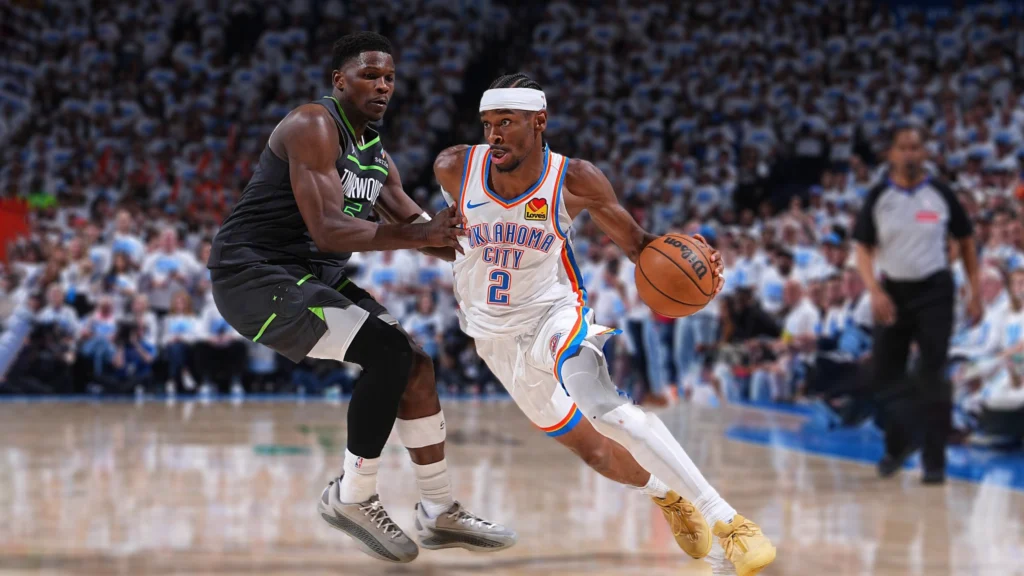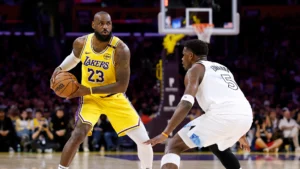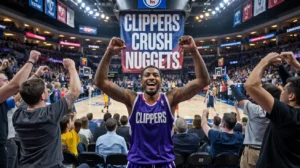
Game 1 of the 2025 NBA Western Conference Finals did more than give the Oklahoma City Thunder a dominant win over the Minnesota Timberwolves. It introduced the league to what may soon become its next major rivalry. The Thunder’s 114-88 victory was not just a strategic triumph—it was a psychological one, defined by sharp defensive tactics, emotional intensity, and a brewing personal conflict between rising superstars Shai Gilgeous-Alexander and Anthony Edwards.
Shai Gilgeous-Alexander delivered yet another commanding playoff performance, overcoming a slow start to finish with 31 points and 9 assists. His composure and ability to control the game’s tempo in the second half sent a clear message that the Thunder are not just young contenders—they are serious about seizing the Western Conference crown. On the other side, Anthony Edwards, widely regarded as the Timberwolves’ driving force, was visibly frustrated throughout the night. A controversial technical foul in the first quarter, which many fans and analysts considered unwarranted, symbolized the mounting pressure and emotional stakes of this high-profile series.
The growing tension between Gilgeous-Alexander and Edwards is central to what is emerging as a high-stakes rivalry. While Gilgeous-Alexander offered a calm, team-first perspective postgame—stating “it’s not about one guy”—the intensity on the floor told a different story. Edwards, meanwhile, acknowledged the Thunder’s hunger but made it clear that he was not backing down, setting the stage for a more aggressive showing in Game 2. Their contrasting approaches—SGA’s poise against Edwards’ fire—add a compelling narrative that extends beyond the stat sheets.
Defensively, the Thunder showcased the kind of cohesion and discipline that separates playoff winners from pretenders. Their effort was spearheaded by Alex Caruso, who hounded Edwards all night and played a key role in neutralizing Minnesota’s offensive flow. The Timberwolves committed 19 turnovers, many of which led directly to points for Oklahoma City. The Thunder’s physical play and relentless pressure did more than disrupt possessions—it rattled Minnesota’s confidence and exposed vulnerabilities in their mental and tactical approach.
This level of psychological warfare is a hallmark of great NBA rivalries. The Thunder, a team built around youth and development, appear to have embraced the playoff spotlight without hesitation. Their energy, discipline, and unity under head coach Mark Daigneault stood in contrast to the Timberwolves, who struggled to adjust and appeared emotionally unsettled as the game progressed.
With both teams boasting elite young talent, strong coaching, and aspirations of championship contention, all the ingredients are in place for a rivalry that could define the Western Conference for years. The presence of star power, emotional volatility, contrasting playing styles, and now, postseason stakes, means this matchup may evolve into more than a single playoff series—it may become the next defining conflict in modern NBA basketball.
Looking ahead to Game 2, the Timberwolves must regroup quickly and address both strategic gaps and emotional discipline. Edwards will likely aim to reset the tone with a more focused and assertive performance, while the Thunder will look to maintain their momentum and exploit Minnesota’s mistakes. The stage is set for another intense battle, and with the narrative heating up, fans can expect a fiercely competitive continuation to what is quickly becoming the NBA’s most compelling new rivalry.

